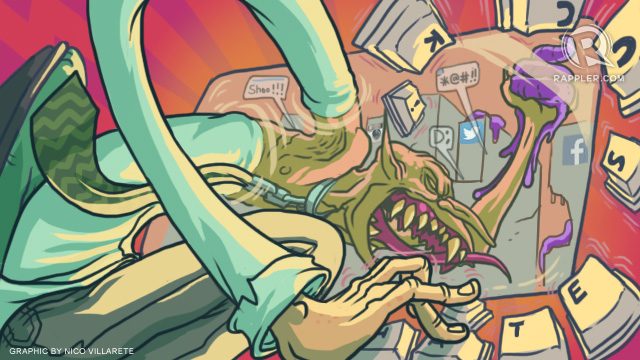SUMMARY
This is AI generated summarization, which may have errors. For context, always refer to the full article.

When writer Didi Paterno-Magpali wrote an article describing her not so ideal experiences as an OFW, she was called whiny, unprepared, and irresponsible. I was surprised to see such nasty comments on a piece I considered just a benign eye-opener on the OFW life.
When Anna P. Santos wrote an article enumerating the costs of pregnancy and childbirth, she was called anti-baby, anti-woman, and a curse to her parents.
Netizens have become so brazen in their insults that the US talk show host Jimmy Kimmel now features celebrities reading mean tweets about themselves, including one where Emma Stone reads, “Emma Stone looks like she smells like cat piss.”
Why are people vicious online?
Comedian Louis C.K. said it best when he described the difference between face-to-face comments and social media comments, especially in children:
“You know, kids are mean…They look at a kid and they go, ‘You’re fat,’ and then they see the kid’s face scrunch up and they go, ‘Oh, that doesn’t feel good to make a person do that.’…But when they write ‘You’re fat,’ then they just go, ‘Mmm, that was fun. I like that.'”
According to psychologists, humans are designed to communicate in person, taking all non-verbal cues like facial expressions, tone and pitch of language, and gestures into account. When we are stripped of these cues (as in online communication), there is either a sense of ambiguity that causes people to be extremely sensitive to someone’s written word, or a marked indifference that makes people feel it’s okay to be hurtful if one is kept away from his or her subject’s immediate reaction.
It makes total sense that online comments are often shameless, scathing, and cruel. The fact that comments are seen publicly adds fuel to the fire as well. A study from Columbia University found that “likes” and other forms of online validation increase a person’s self-esteem and decreases their self-control. This means that getting “likes” might actually cause you to believe you’re smarter than you really are, making you more likely to exhibit impulsive behavior (such as posting inappropriate comments online).
Opinionated does not equal smart
Because of this validation-inflated sense of self-worth and entitlement, many people mistake having an opinion and broadcasting it on social media for being intelligent. Even if the said opinion is misplaced, oppressive, hurtful, and even illogical, it only takes the “likes” of a few like-minded people to make its source feel brilliant and hungry to be heard.
Anonymity makes one feel invincible and invisible. Trolls who hide behind anonymous Twitter and Facebook accounts believe nobody can physically come after them or tell them how hurtful they are. A study from the University of Manitoba even linked troll behaviors to Machiavellianism (willingness to manipulate and deceive others), narcissism (egotism and self-obsession), psychopathy (the lack of remorse and empathy), and sadism (pleasure in the suffering of others).
Even if mean commenters do get a response, they easily dissociate themselves from their online personalities and seldom feel responsible for their actions. Without visible and real-time repercussions, it’s easy to discount their actions as “just for fun” instead of having real consequences. Meanwhile, this same person online probably couldn’t even say a single thing to their subjects’ faces in real life, because the subject’s reaction would be a very tangible consequence they couldn’t run away from the way they do when they disconnect from their online personas.

There’s nothing wrong with criticism or sharing opinions, but oftentimes the lack of limits or immediate feedback causes people to become rude and hurtful. The absence of face-to-face contact causes people forget to about manners and kindness entirely. Comments sections and social media have suddenly made everyone an opinion writer whose insights they feel must be heard by the world. Take a look at any popular article’s comment section and you will find comments as long as the article itself. People do take the time if they feel they will be heard.
While 41% of online users do not participate in comment sections, many of those who do feel they have been given a medium, and this becomes liberating and empowering for them to believe they have a license to say anything online.
Expressing a different opinion is always welcome, but being nasty, insulting, and rude when communicating online is unacceptable, no matter what side you’re on or what objective you have. Just think of face-to-face conversations. No matter how valid a person’s points are, if he or she does it impolitely, they are often dismissed if their ideas are not expressed in a respectable manner. The same goes for online interactions, but it’s so easy to forget about this when we treat online communication like we’re hurling a rock at someone and then running away.
What do we do about haters?
For the most part, mean commenters, trolls, and rude people are just looking for confrontation, or a way out of their boredom or personal issues. Ignoring them sometimes makes them braver, thinking there are no repercussions to their rudeness and outbursts. But if you engage them, then you have just added fuel to their fire, elevating them from a hysterical hate-spewing person in the street to a rational person actually worth a conversation.
The most cruel insults are hurled at celebrities on a daily basis, but very rarely do you even see a public response. This is because celebrities are aware that by making a person of stature into a caricature by way of public insults, a rude person feels they have made this person small, worthless, and humiliated – at least in their minds. An actual response by the subject makes the insult “real” and acknowledges its damage, giving the source of the insult the thrill of “communicating” with the subject.
If you think you might be a hater, always stop to think before you say something online. Imagine those words being said to you (or to someone you care about) by a stranger face to face. Just because reaction and retaliation aren’t immediately possible online doesn’t mean we should forget how our actions make other people feel. Everything goes a lot smoother if people just take the time to be kind.
If you are part of the “hated,” don’t forget that there is a reason haters take the time to try and hurt your feelings. They are either bored or want you to feel how they feel about themselves. Your presence, your happiness, or your sentiments have struck a chord in them, and they cannot just walk away without “striking back.”
If you’ve got haters, don’t worry. I’ve got them too! When I get frustrated, I just remember this important quote by Winston Churchill:
“You have enemies? Good. That means you’ve stood up for something, sometime in your life.” – Rappler.com
Shakira Andrea Sison is a Palanca Award-winning essayist. She currently works in finance and spends her non-working hours avoiding mean people in subway trains. She is a veterinarian by education and was managing a retail corporation in Manila before relocating to New York in 2002. Her column appears on Thursdays. Follow her on Twitter: @shakirasison and on Facebook.com/sisonshakira.
iSpeak is Rappler’s platform for sharing ideas, sparking discussions, and taking action! Share your iSpeak articles with us: move.ph@rappler.com.
Tell us what you think about this article in the comments section below.
Add a comment
How does this make you feel?
There are no comments yet. Add your comment to start the conversation.